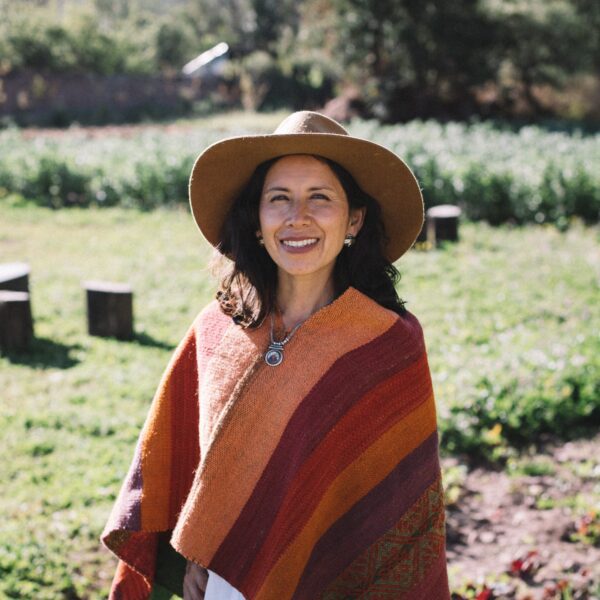In this tour, you will walk along a section of the great Qhapaq Ñan, or Inca trail, that still remains intact in this area of Lake Titicaca.
Pukara men and women, Incas, soldiers, priests, slaves and slave traders used to walk along this section of the Qhapaq Ñan. Now, travellers like you get the chance to follow in their footsteps. When doing so, you will be accompanied by a herd of llamas and guided by the local people themselves.
The people of Jayujayuni are guardians of their ancestral culture and have organised themselves to offer a great learning experience to their beloved visitors. They will gladly share stories about their natural medicine, their approach to livestock farming, and their music and dances. Real hosts of the Qhapac Ñan.
At 8.30 am, we will depart from Puno (pick up at your hotel) and arrive at the community around half an hour later. They will welcome you, explain about the community organization and you can get some first insights into the trail.
You will then begin your walk on the Qhapaq Ñan. At the highest point of the trek (Apacheta Alta), you will get the unique opportunity to take part in a “Pago a la tierra” Ceremony (= payment to the Earth).
After that, you continue hiking, passing through a Stone Forest (also called Enchanted Valley Tiritiri). You will soon arrive at the community center, where ancestral knowledge about aromatic plants will be passed on to you.
At the end of this experience with the hosts of the Qhapac Ñan, you will be able to taste different snacks and relaxing “mates” (teas), and witness a festive farewell dance called “Varados de Ichu”. At around 1 pm, we will drop you back off at your hotel in Puno.
Would you like to get a more in-depth experience at Lake Titicaca and spend more time there? Have a look at our Multi-Day Titicaca Tours in that case. If one day is enough for you, but you are not sure if this tour is the right fit for you, why not check out the rest of our One-Day Lake Titicaca Tours?
Photography credits: Giulianna Camarena Montenegro / PNUD Perú / Qhapaq Ñan

The group that works in this experience consists of 23 community members. Depending on their skills as tour guides, musicians or dancers, every member has been designated a specific task, helping out in one of the included activities. Their minimum wage has been discussed and agreed on by the community itself and is fair.
The local population has been very well trained in cultural interpretation and in leading tourist visits. They have also received training in conservation principles, sustainability and biosecurity protocols.
This tour with the hosts of the Qhapaq Ñan is physically not very demanding. However, please note that lake Titicaca lays at 3.800 meters (12.500 feet) above sea level, which means that one might experience altitude sickness. To prevent that, make sure you stay hydrated and you should not have any problems. Drink up to three litres per day; soup, water and (coca) tea are always good. We also highly recommend wearing a hat or cap, as the sun can be very strong at such altitudes. Should you not feel good despite your precautions, talk to your guide or host family and they will be happy to help out.
No, these hosts of the Qhapaq Ñan don’t. So far, however, most of our travelers do not opt for an optional translator, since apart from the additional cost that might change the experience. Our host families are very used to having guests that don’t speak Spanish. Also, their Spanish is easy to understand for those who speak other Latin languages.
Of course, learning Spanish beforehand is always a good idea! Use an app like Duolingo to learn the basics before leaving and enhance your experience whilst traveling.
On Lake Titicaca it gets very hot during the day and as soon as the sun sets, temperatures drop quite a lot. So be prepared for the sun (hat, sunscreen, drink lots of water), but also pack some warm clothes for the night. You will see the hosts of the Qhapaq Ñan are all wearing a colorful hat.
For questions about booking a tour, prices, preparation for your trip, health and safety or other themes, please check our Frequently Asked Questions page. If you can’t find your question & answer, email us and we’ll add it!

My name is Eliana Pauca and I was born in Arequipa. I have been in tourism since I was 15 years old and I have worked as a tour guide in French, English, German and Spanish. About my studies: I studied Historical-Archaeological Sciences at the Santa Maria Catholic University of Arequipa and later I did a Master’s Degree in Public Policy for International Development at Duke University in North Carolina, USA.
I have lived and worked in the city of Puno on the shores of Lake Titicaca for 16 years. Currently, I live in Barcelona and continue working to develop sustainable tourism in Peru. Every year I return to my country with the aim of developing and supporting unique, sustainable and environmentally conscious tourist experiences. My special interest is the identification of economic opportunities for rural communities. It is my purpose to use tourism as a tool for social, cultural and economic development in Peru and to promote the dissemination of our culture and ancestral knowledge for the benefit of the visitor and the local people.
I am committed to sustainable and responsible tourism because, well done, the tourism industry is a powerful development tool. With responsible tourism we manage to make the visitor enjoy a transformative experience and the local population to reinforce their self-esteem and value their cultural identity while receiving economic income that allows them to improve the education and health of their children.